Grounded. In airplane parlance, it’s an ironic way to describe someone who oversees the fifth largest airline in the country, but that’s exactly how friends and colleagues of US Airways Chairman and CEO Doug Parker, MBA’86, view him. While he’s adept at managing the 30,000-foot view, they say he remains one of the most down-to-earth people they know—even as his embattled industry confronts soaring costs and plummeting customer satisfaction.
Parker, who steered America West Airlines from bankruptcy to profitability in the ’90s and then engineered a successful merger with US Airways in 2005, launched his career in the airline industry with American Airlines. The Dallas-based company offered him his first post-MBA job during a recruiting visit to the Owen School.
“The fact of the matter is, I don’t think I would have been in this business if it weren’t for Vanderbilt,” he says from his company headquarters in Phoenix. “American Airlines recruited only MBAs, and they did so only at a very select group of schools. Because of the Vanderbilt connection, I was able to get hired.”
In recent years Parker’s strong views about the value of mergers and consolidations in restoring the industry to profitability have earned headlines. A bid for Delta Air Lines, initiated in late 2006, was rebuffed (a Delta-Northwest merger was announced earlier this year), and talks with United Airlines stalled. But Parker remains characteristically optimistic, despite cost-cutting imperatives driven by rising oil prices.
Team Building
Parker saw the merger of America West and US Airways as a mechanism for building on the best of both worlds. The two airlines had similar cost structures and together created a larger customer base and more business markets. “We didn’t raise prices; it was about making us both more efficient,” Parker explains.
The merger, though profitable, wasn’t without snags, including the headaches of integrating two information systems. There have also been new challenges, such as skyrocketing oil prices and growing problems with customer satisfaction, which US Airways has tackled with spectacular success, going from last place to first in on-time arrivals during the first six months of 2008.
Even after 20 years in the business, Parker maintains a relish for grappling with complex problems that his classmates remember from his days at Owen. “We’ll figure out a way to make this industry profitable again, even if the oil prices remain high, but it will be a different industry,” he says.
No doubt he will lead the company toward making necessary innovations a reality with a focus on team building, his signature management style.
Parker’s team-centered leadership style harkens back to his days playing high school and college football, says Elise Eberwein, Senior Vice President for People and Communications at US Airways, who has worked with Parker for five years.
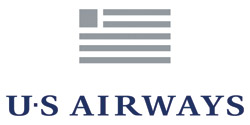
“He is completely ‘relatable’ to employees of all levels and backgrounds. By relatable, I mean he laughs at the same jokes, is so incredibly down-to-earth, and cares about things that matter to our people as opposed to just the 30,000-foot view. Don’t get me wrong—he cares about that, too—but he is very connected to the emotional things that matter to people day in and day out at their jobs,” says Eberwein, who estimates Parker spends 50 percent of his time getting to know employees at all levels.
She says he truly wants divergent views at the table and has created a culture where differences in opinion are handled respectfully. “I’ve worked for several CEOs and been around a lot of high-level executives. Doug is by far the best team builder and ‘head coach’ I’ve seen,” she says.
Parker made news after the US Airways-America West merger when he refused a bonus based on America West’s performance the previous year because he felt it was unfair to US Airways employees whose salaries had been cut. More recently, he made a large personal investment in company stock.
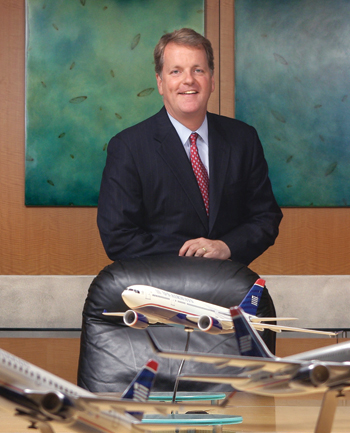 A Reflection of His Character
A Reflection of His Character
It did not surprise any of Parker’s Owen friends to see him step up and make a large investment during a dark time for the industry, according to David Hornsby, MBA’86, Owner of Executive Travel and Parking in Nashville.
“Doug has always had this ‘never say die’ optimistic bent. … That’s just the way he’s always been,” says Hornsby, who has remained close to Parker since their days at Owen. Hornsby and others describe Parker as a fun-loving guy and a generous friend who is always punctual, neat and full of ideas.
“Doug has always been extremely analytical. He was always coming up with a ‘system’ for everything. We put a lot of faith in Doug’s systems, and I’m sure he is a master of systems at US Airways,” Hornsby says.
Owen School Dean Jim Bradford says Parker’s focus on finding systems that work rather than copying existing operations was a huge factor in the success of the US Airways-America West merger. “It’s a reflection of his character, organization and strategic initiative that when he rebuilt America West, he didn’t just copy a successful airline like Southwest; he made strategic changes that saved costs but with an ultimate focus on customer service,” Bradford says.
Parker and Hornsby are part of a tight-knit group from the MBA Class of 1986, and Parker says the strong friendships he made at Owen were the most important part of his graduate school experience.
Bradford recalls how well Parker’s friends from Owen have helped keep him grounded, particularly right before the airline executive was slated to speak at a class reunion gathering: “Here’s a successful guy speaking at a ‘no-risk’ conference. One of the things his classmates did the night before he was speaking to the entire group was pepper him with really nasty questions they were pretending to prepare for the next day. Of course, they love him to death. It was funny to watch him get a little nervous.”
Parker met his wife, Gwen, a former flight attendant, through mutual friends while living in Dallas. It was a courtship witnessed by Owen classmate Jim Loftin Jr., MBA’86, who also worked for American Airlines after graduation.
“I knew when Doug had found his bride,” says Loftin, now President of JDL Management and Consulting in Dothan, Ala. “I was visiting him in Dallas and, for the first time I had ever seen, he was particularly interested in attending a specific party. Doug was always a go-with-the-flow kind of guy. When we arrived, I noted Doug had a bit of uneasiness I had never witnessed before. On more than one occasion that evening, Doug would say, ‘Hey Jimbo, come on, let’s go over here.’ It was always within 10 feet of Gwen. She paid him no attention that evening, but it was only a matter of time before those two would tie the knot.”
The Parkers are the parents of three children—Jackson, 13; Luke, 10; and Eliza, 8—and live in Paradise Valley, Ariz.
“Doug’s a great dad and husband,” says Andy McCain, MBA’86. “He’s managed to balance that pretty well with being CEO in an industry that’s had more difficulty than any other that size.” McCain, who is Vice President and Chief Financial Officer of Hensley & Co., is another member of that tight-knit group from the Class of 1986. He lives in Phoenix and is one of Parker’s closest friends.
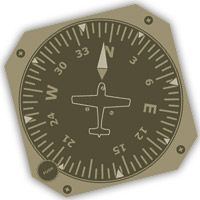 One Crisis After Another
One Crisis After Another
Parker spent five years at American in Dallas, holding a variety of financial management positions, before joining Northwest Airlines in 1991. His titles at Northwest included Vice President and Assistant Treasurer, as well as Vice President of Financial Planning and Analysis.
“Northwest was going through an LBO (leveraged buyout) and looking to hire new management to improve their team,” Parker recalls. “I loved my time at American, but I was ready to do something where I could make even more of a difference by building some things really from scratch.”
After four years with Northwest, he was recruited in 1995 at age 33 to become Senior Vice President and Chief Financial Officer at America West, based in Tempe, Ariz. “It was a smaller airline going through similar things Northwest had gone through a few years before. The new management was trying to build a new team. It was a great opportunity for me that I couldn’t pass up. I’ve been here ever since,” Parker says.
He was named CEO of America West on Sept. 1, 2001. “It was a good 10 days,” he says wryly.
The industry, already troubled before the Sept. 11 disaster, lurched into crisis mode after those events. Parker led his company through a loan guarantee process that helped turn it around by 2005, the same year America West initiated a merger with US Airways, then in bankruptcy and in danger of shuttering its operations. By 2007 the combined airline, with Parker in the leadership role, earned $427 million in profits.
Unfortunately those profits are now being eaten away by huge increases in oil prices. The company is predicting that spending on fuel alone could increase by $1.8 billion dollars in 2008 over the previous year. Fuel prices now represent a staggering 40 percent of the operating budget, Parker says.
Although the current obstacles are daunting, Parker recalls that in 2001, many pundits similarly believed America West “was done.”
“Survival’s a great motivator,” he says. After Sept. 11 the airline was forced to better understand customers’ needs, making changes accordingly, and to redefine the airline with a low-cost structure.
But America West executives knew the operational turn-around might be tenuous. “So as we looked at America West, we were very concerned about our viability because we had an airline that never had the same revenue generating capacity” as other airlines, he says. “We made up for it with lower cost structure, but we had cause for concern.”
The merger with US Airways was an opportunity to expand into more business markets and afforded a larger customer base.
“I recall vividly when we were putting this merger together that there was concern about oil prices, which were then $50 a barrel,” he says. Company managers were confident that they could succeed despite the high costs of fuel. “But when oil prices jump from $90 to $145 in a matter of months, that has a profound impact on our business. There’s a lot of financial turmoil in the business that we’re not immune to.”
Tackling Problems Head-On
Parker, always one to see the silver lining, says soaring oil prices have similarly forced the industry to address airport capacity issues. “Six months ago we were spending a lot of time working on how to fix the congestion issue,” he says. “It was much of what everyone was talking about. The fact of the matter is, oil fixed that. We were forced to take 10 percent of capacity out right away. It will come back one day, but the impact of oil overwhelms everything else.”
Six months ago we were spending a lot of time working on how to fix the congestion issue. The fact of the matter is, oil fixed that. We were forced to take 10 percent of capacity out right away. It will come back one day, but the impact of oil overwhelms everything else.
~ Doug Parker
The new US Airways is aggressively addressing the issues it can, as evidenced by the dramatic turnaround in on-time arrivals in 2008. Parker credits this accomplishment in part to several key hires, including Robert Isom, recruited from GMAC Financial Services less than a year ago as the airline’s Chief Operating Officer. Parker and Isom worked together both at Northwest and America West before Isom left the industry for GMAC. Suzanne Boda, another key hire, joined US Airways in January as Senior Vice President for the East Coast, where airline congestion has been a particular challenge. Boda is also a Northwest Airlines veteran.
A mark of Parker’s style is that he stayed in the background as the turnaround was announced and let his executives take the lead. In July, an article in The Wall Street Journal trumpeting the airline’s new data never mentioned the CEO’s name, quoting Isom and Boda instead.
“If someone suggested we’d go from 10th to first in a year, I would have thought it was too much, but we’ve done it and it is a credit to all our people,” Parker says.
The company accomplished the performance turnaround in part by focusing on getting planes out of the gate on time, rewarding employees for better service, and investing millions in capital improvements.
A major challenge was integrating the communications systems more effectively, something that took time and led to frustrations for travelers after the merger.
“In our case, through that operational integration, we’d gotten ourselves into running a much worse operation than we wanted to run,” Parker says. “We knew the problem would get fixed when integration took hold, but we also knew we needed to take additional action because of what those problems meant from a customer perception standpoint. We had to win customers back. We put a tremendous amount of focus on it, including bringing in new people who knew what to do.”
Meanwhile, the airline is finding other ways to adapt to rising costs. Among those in the news are such changes as per-item charges for baggage and other efforts to “de-bundle the product,” such as charging for drinks. US Airways also announced it would stop giving bonus miles to frequent fliers and begin charging between $25 and $50 for booking award tickets, calling the cost-saving measures “necessary realities.” Other airlines announced similar cost-saving measures.
“We want to concentrate on providing great service on our core product, which is getting our customers from point A to point B on time,” Isom explains.
Isom says while people in the industry have been talking for months about how to confront the cost issue, he enjoys the culture at US Airways, which is focused on tackling problems head-on. “None of us are people who are going to wait around without charging ahead,” he says. “The worst thing you can do is sit back. It’s time for bold measures.”
Isom worked indirectly for Parker during his first post-graduate job. “I can credit Doug with getting me into the business and pulling me back in after I got out,” Isom says. “Not only is he a really good friend, but he’s a charismatic guy whom you want to work with.”
In His Element
“Every organization has its own cul-ture and feel,” agrees Bradford. “When you’re around Doug, you recognize the quality of this human being. He genuinely wants what’s best for the company, and he treats the school the same way.
“What really comes across with Doug is that here’s a very accomplished business guy who values integrity above all things and is a real family man,” Bradford says. “His success hasn’t gone to his head. He’s firmly grounded in his value system, and his leadership comes from that value system.”
While Parker strongly believes that the industry won’t be able to avoid looking at the efficiencies of combining airlines in the coming years, he predicts the current environment of skyrocketing oil prices will freeze any movement in that direction during the coming year, and maybe longer, except for the recently approved Delta-Northwest merger.
“The airline industry is very fragmented,” he says, citing the fact that American Airlines, for example, has less than 20 percent market share. “It’s hard to find businesses like that outside the airline industry. The fact that we’re highly fragmented is a lot of the reason we go through this turmoil. It’s just so hyper-competitive.”
Parker predicts that the Delta-Northwest merger will be fraught with hazards similar to those faced by US Airways and America West. “There will be hiccups. There is so much to integrate from an operational standpoint. You can’t turn it on overnight and not have consequences to deal with.”
Although he knows the industry is in for a bumpy ride, he wouldn’t change the course of his career. “I love it. It’s a great business. It’s extremely dynamic. If you’re looking for a business that runs itself in a steady state, that’s not what this is. But I like that part,” he says.
“It’s not for the faint of heart,” he says, as he shuffles through papers on his desk for his next meeting and prepares to deal with tomorrow’s chal-lenges. “There are times when you wish for some level of normalcy. But if I had some level of normalcy, I’d probably be bored. I enjoy the challenges.”
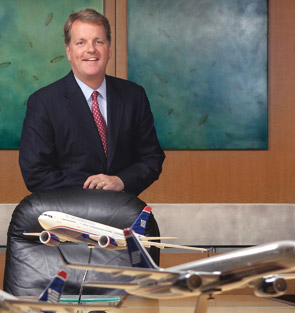
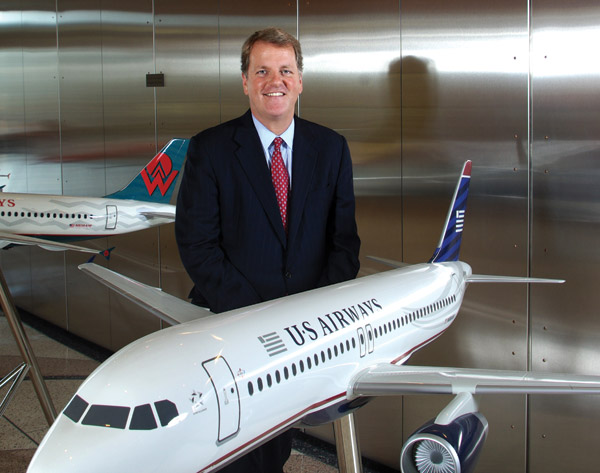
Comments
One response to “Riding Out the Turbulence”
[…] I wanted to add to what Owen alumnus Doug Parker (MBA ’86) talked about in his Commencement address when he discussed the importance of relationships. For me, […]